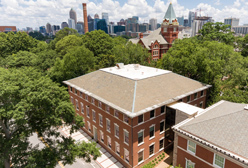Sponsored Research
Paul M.A. Baker, Adjunct Professor and Director of Research, Center for Advanced Communication Policy (CACP), has been awarded two contracts from the University System of Georgia (USG) Board of Regents: $40,000 for “Phase II External Evaluation of University System of Georgia (USG) STEM Initiative (STEM 1&2)” and $212,500 for “USG Office Of Educator Preparation, Innovation And Research: Strategic Planning, Policy and Programmatic Support.”
Marilyn Brown, Professor in Public Policy, has been awarded two new grants from the Oak Ridge National Laboratory: $75,000 for "Behaviorally Based Policies for Better Buildings" and $66,000 for "GT GRID Innovations Leaders Fellowship Project."
Phil McKnight, Professor and Chair, School of Modern Languages, has been awarded $20,000 by the Japan Foundation for a Salary Assistance Program for Japanese Language Courses.
Celia Pearce, Assistant Professor, School of Literature, Communication, and Culture has been awarded $101,447 by the National Science Foundation for "EAGER: Creative Activity and Development of IT Skills Among Women in Virtual Worlds."
Phil Shapira, Professor in Public Policy, has been awarded by ERAWATCH $67,000 for "Trend Chart Integration X.07." The project is developing assessments of US and Chinese innovation policies, with European Union sponsorship. Lead researchers on the project are Shapira, Li Tang of the School of Public Policy and Jan Youtie of the Georgia Tech Enterprise Innovation Institute.
New Books by Faculty
Multicultural America: An Encyclopedia of the Newest Americans (ABC-CLIO/Greenwood) edited by Ronald Bayor, Professor in the School of History, Technology, and Society. This encyclopedia presents 50 profiles of the most numerically significant immigrant groups now making their homes in the United States and tells the stories of our newest immigrants.
How to Do Things with Videogames (University of Minnesota Press) by Ian Bogost, Professor, School of Literature, Communication, and Culture. Bogost explores the many way computer games are used today, presenting them as a mature mass medium with unlimited potential for cultural transformation.
What Does Georgia Tech Think?
Selected Press for Ivan Allen College of Liberal Arts
|
Bogost on How to Do Things With Videogames
"In my previous books I talked about how to use video games to do politics or journalism. Here, I want to encourage interest in every possible use of the medium," says Ian Bogost, Professor in the School of Literature, Communications, and Culture and Director of the Graduate Program in Digital Media, on his forthcoming book How to Do Things With Videogames. Read the full interview in Creative Loafing, August 9, 2011.
Brown on Southeast's Lag in Adopting Renewable Energy Policies
Marilyn Brown, Professor in the School of Public Policy and expert in renewable energy policies, said the Southeast has untapped energy at its disposal. She said local states could burn biomass in coal-fired power plants without changing much equipment. Policymakers could make it easier for manufacturers to install generators that convert heat produced by factories into electricity that can be sold to consumers. "I do think there are some misunderstandings about the available resources," she said. Read the full story in the Boston Globe, August 6, 2011.
Endicott Recruiting for Woosong University
"I have to stress the benefits of having all these kids from different worldviews," said John Endicott, President of South Korea's Woosong University, noting that the "diversity makes for rich discussion in the school's small classes." A former professor in the Sam Nunn School of International Affairs who was twice nominated for the Nobel Peace Prize for his work on nuclear nonproliferation in Northeast Asia, Endicott was in Atlanta to recruit students and was honored by the Korean-American Association of Greater Atlanta. Read the full article in Global Atlanta, August 5, 2011.
Breznitz and Murphree on Run of the Red Queen
"China's companies are extremely efficient at creating new versions of technologies and products shortly after they are invented and marketed elsewhere in the world. This is product innovation," says Dan Breznitz, Associate Professor in the Samn Nunn School of International Affairs, discussing his book Run of the Red Queen which he co-authored with Michael Murphree, an International Affairs PhD student. Murphree adds, "Innovation is not just invention; it's the whole array of moving and improving inventions." Read the full interview in the New York Times, August 4, 2011
Wang on the Cultural Significance of Bullet Train Crash in China
"It will certainly recast the current development model in some more critical light," said Fei-Ling Wang, Professor in the Sam Nunn School of International Affairs, describing the possible cultural effects of the controversial bullet train crash in the eastern Chinese province of Zhejiang that killed at least 40 people in June. "And it may have an impact on China's image and humble the enthusiasts, perhaps for the long-term good of China." Read the full article in Google News, August 2, 2011.
Breznitz on Atlanta as a Technology Hub
"You look at the actual social structure of [Atlanta] and see that we have a huge amount of fragmentation. Companies and industries are just not connected to each other," says Dan Breznitz, Associate Professor in the Sam Nunn School of International Affairs, addressing Atlanta's progress toward becoming a haven for technology and industry in the same manner as cities like Boston or San Diego. Read the full article in the Atlanta Journal-Constitution, August 2, 2011.
Ferrari on Channel 4's "Sweatshop" Game
"Sweatshop is a game that... becomes gradually more and more complex to control over time. As its play deepens, so too does its procedural rhetoric," writes Simon Ferrari, Digital Media PhD student in the School of Literature, Communication, and Culture, about Sweatshop, a new browser game developed by Littleloud for the British Government's Channel 4 Education. Read the full article on PBS' MediaShift Idea Lab, July 27, 2011.
Breznitz, Goodman, and Murphree on Data Collection and Privacy
"The fact that private industry does most of the surreptitious gathering, processing, sale, and then use of data may be at least as threatening to a viable democratic society's personal liberty and core values as the traditional fears of a state panopticon." So say Dan Brenznitz, Seymour Goodman, and Michael Murphree, respectively an Associate Professor, Professor, and PhD student in the Sam Nunn School of International Affairs, in their jointly-authored essay "Ubiquitous Data Collection: Rethinking Privacy Debates." Read the full article in Computer, June 2011.
Gibes Tracks Congressional Partisanship
The Clear Congress Project is a data-visualization tool made by Thomas Gibes as his master's thesis project at Georgia Tech [LCC Digital Media Program]. The graphical display visualizes partisanship and leadership in Congress, and is updated constantly to display all legislative activity to date. Read full article in the Maddow Blog, July 19, 2011.
Wang on Wealth Sharing in Huaxi, China
"This is called exploitation," said Fei-Ling Wang, Professor in the Sam Nunn School of International Affairs, in reference to the treatment of migrant workers in Huaxi, China. "Because the outside workers, by law, cannot become a local resident. They cannot share the results of their works. They are paid by wages, and if they lost their job, they are simply sent home." Read the full article in the New York Times, July 18, 2011.
Boston on Jobs Recovery
"We have to do something about the housing sector," said Thomas "Danny" Boston, Professor in the School of Economics, in a televised interview on CNN. "Trying to recover jobs without a healthy housing sector is like running a train down the track with a caboose with its brakes on." Boston also pointed to the corporate and small business sectors as areas that need to improvement in order to create more jobs. Source: CNN, July 9, 2011.
NROTC Alumnus Sean Barner Honored
"I'd never seen anything like this - it's movie stuff," said Lt. A.J. Walker, Assistant Professor of naval science who worked with recently honored Georgia Tech NROTC alumnus Sean Barner. "Barner is a very humble guy, but when word got out of what he'd done, he was recommended for an award." Navy Ensign Barner was presented with the Navy and Marine Corps Medal, which is given for heroism while not in combat, for his actions foiling an armed robbery at a College Park apartment party in 2009. Print-edition-only article appeared in the Atlanta Journal-Constitution, July 3, 2011.
Bolter on A Networked Self
"The complex and sometimes contradictory phenomena of social media are among the most discussed aspects of digital culture today," says Jay David Bolter, Professor in the School of Literature, Communication, and Culture, "and A Networked Self examines these phenomena through a variety of perspectives and approaches from sociology and communication theory." A Networked Self is a collection of essays examining self presentation and social connection in the digital age, edited by Zizi Papacharissi. Read the full article in Networked Performance, July 1, 2011.
Bogost on the Future of Gaming
Ian Bogost, Associate Professor in the School of Literature, Communication, and Culture, and Director of Graduate Studies in Digital Media, took part in the Inventing the Future of Games Symposium hosted by UC-Santa Cruz's Center for Games and Playable Media. Bogost spoke of a future "in which games are as ubiquitous and ordinary as photographs, and used for as many purposes." Games as advertising is not a new thing by any means (see Burger King’s Sneak King), but Bogost brought up an even more banal possible usage: airline safety. Read the full article in SantaCruz.com, June 29, 2011.
Long Explores Global Health Issues in New Book
Pandemics and Peace, the most recent book by William J. Long, [former] Professor and Chair of the Sam Nunn School of International Affairs [now Dean of the GSU College of Arts and Sciences], "emphasizes opportunities for the U.S. to assume a leadership role in global public health." The Mekong Basin, the Middle East, and East Africa are Long's focus in this book, as they serve as examples of areas that have seen countries cooperate to fight against pandemics despite volatile regional tensions. He also "explores how public-private networks deliver public health services in violence-prone locations". Read the full article in Global Atlanta, June 23, 2011.
Murray on the Future of the Written Word
"We have exhausted our ability to say all we know about the world through print alone," said Janet Murray, Professor in the School of Literature, Communication, and Culture. "Yet current e-books are lame and frustrating because they don't incorporate colour, video, or any other digital possibilities. New media of representation will force us to think radically and to create new genres." Murray's remarks came from a panel on the future of reading and writing held at "The Book Tomorrow: The Future of the Written Word," part of the FOCUS 2011 forum held in Lombardy, Italy and organized by the United Nations Educational, Scientific, and Cultural Organisation and the Italian government. Read the full article in Times Higher Education, June 23, 2011.
Boston Contributes to Symposium on Entrepreneurship
"Minority-owned businesses should be an interal part of any plan for economic resurgence," argues Thomas "Danny" Boston, Professor in the School of Economics, in an essay entitled "Minority Report: Expanding Opportunity for All." Boston's essay is part of an online symposium entitled "From the Ground Up: Fostering Entrepreneurship" published by Democracy: A Journal of Ideas and funded by the Ewing Marion Kauffman Foundation. Read about the Symposium in Democracy: A Journal of Ideas, Summer, 2011.
August 25, 2011 - August 26, 2011
September 2, 2011
2:00 pm
September 9, 2011 - September 10, 2011
8:00 pm
September 12, 2011
4:00 pm
September 14, 2011
4:00 pm
September 15, 2011 - September 17, 2011
8:00 am
September 23, 2011
2:00 pm
September 30, 2011
2:00 pm
|
Usselman Named HTS Chair; Interim Chairs Announced; and Chair Searches Underway for Economics and International Affairs
Professor Steven W. Usselman has been named the new Chair of the School of History, Technology, and Society. Also announced are interim leaders for HTS, Economics, and International Affairs, and updates on chair searches.
These leadership changes reflect the transitions of Ron Bayor, Chair of the School of History, Technology, and Society and Pat McCarthy, Chair of the School of Economics to full time faculty, and Bill Long's move from Chair of The Sam Nunn School of International Affairs to the post of Dean at Georgia State’s College of Arts and Sciences on August 8. (Read more in May Newsletter).
Steven W. Usselman, New Chair of HTS
Steve Usselman (PhD, University of Delaware) joined the HTS faculty in 1996 with specialties in the history of technology, innovation, and American political economy.
“Dr. Usselman has been highly effective in recruitment, in program development, and in advancing interdisciplinary education and research across the institute, the academy, and beyond,” said Jacqueline J. Royster, Dean of the Ivan Allen College of Liberal Arts. “We are extremely pleased that Steve will be shaping the future of HTS and that he will join the leadership team. I look forward to working with him to advance the college’s in its mission to innovate at the crossroads of the liberal arts and engineering, science, and technology.”
As Director of Graduate Studies, Usselman secured new sources of funding for HTS doctoral students, launched a cooperative teaching initiative with Georgia Tech's School of Electrical and Computer Engineering, expanded recruitment efforts, and revised the degree and curriculum to incorporate science and sociology into a program initially devoted strictly to the history of technology.
As Associate Director for Research at Georgia Tech's Sloan Center for Paper Business and Industry Studies (CPBIS), Usselman coordinated an extended program of research that brought together faculty from management and the social sciences, GT engineers and scientists working in a variety of disciplines of relevant to the pulp, paper, and packaging industries, and numerous practitioners from those industries. Through a series of conferences devoted to the globalization of the industry, he forged a scholarly network reaching from Brazil to Finland. These activities contributed to a broad-based effort by the Sloan Foundation to foster a new discipline of Industry Studies.
Usselman has been recognized for his accomplishments as a scholar and teacher, receiving the Harold F. Williamson Medal for mid-career excellence from the Business History Conference and the E. Roe Stamps Award for Excellence in Teaching. His research has been supported by the Sloan Foundation, the National Science Foundation, and IBM. He is a recent past president of the Society for the History of Technology and serves on the editorial board of its journal, Enterprise and Society.
Usselman will assume his new responsibilities in January, 2012 after completing work on an Ivan Allen College of Liberal Arts Special Research Award.
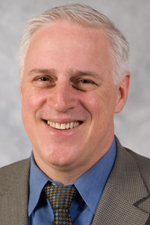 |
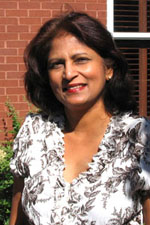 |
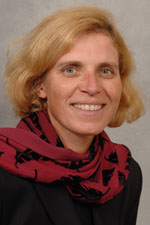 |
| John Tone |
Usha Nair-Reichert |
Katja Weber |
Tone Is HTS Interim Chair
Serving as Interim Chair of the school during the transition period is HTS Professor John Tone. Tone is IAC's Associate Dean for Undergraduate Studies. His responsibilities as Associate Dean for Undergraduate Programs are being temporarily modified so that he can guide the school through the Board of Regents review process that is underway and continue work to strengthen the school's operational systems.
Nair-Reichert and Weber Serving as Interim Chairs for Economics and International Affairs
The College will be conducting national searches for new school chairs in both the School of Economics and the Sam Nunn School of International Affairs. Serving as Interim Chair for the School of Economics is Professor Usha Nair-Reichert. Associate Professor Katja Weber is serving as Interim Chair for The Sam Nunn School of International Affairs.
Chair Searches Committees
For the School of Economics, the search committee members will be: Jay Telotte, Interim Chair, LCC (Committee Chair); Thomas Boston, Professor, ECON; Byung-Cheol Kim, Assistant Professor, ECON; Haizheng Li, Professor, ECON; Ruth Uwaifo, Assistant Professor, ECON; Kari White, Communications and Placement, ECON; Mary Frank Fox, IAC Advance Professor, PUB POL; Chip White, Schneider National Chair in Transportation and Logistics, ISYE; Carmen Butler, OHR (ex officio).
For the Sam Nunn School of International Affairs, the search committee members will be: Ken Knoespel, McEver Professor in Engineering and Liberal Arts, LCC/HTS (Committee Chair); Vicki Birchfield, Associate Professor, INTA; Sy Goodman, Professor, INTA/CoC; Larry Rubin, Assistant Professor, INTA; Adam Stulberg, Associate Professor, INTA; Wanda Moore, Administrative Manager, INTA; Vivek Ghosal, Professor, ECON; Beth Mynatt, Professor, CoC; Pearl Alexander, OHR (ex officio).
In announcing the search committees, Dean Jacqueline J. Royster said, “We are grateful to all of these colleagues for agreeing to shepherd these critically important processes on behalf of the Schools, the College, and the Institute. Over the course of this coming academic year, we should all be prepared to forward the names of potential candidates to the search committees and to support all of the search activities in which we are asked to participate in order to assure the selection of individuals who will provide the qualities of leadership and service capable of continuing and advancing excellence in the Ivan Allen College of Liberal Arts.”
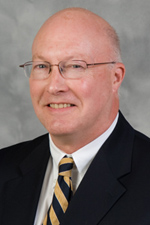
Telotte Continues as Interim Chair as School of Literature, Communication, and Culture Undergoes Review
Dean Royster established in January a task force to review and reform the School of Literature, Communication, and Culture based on their Board of Regents review report. The task force report and discourses surrounding it will inform the development of a strategic plan for the school going forward. In turn, this process will inform the LCC search for a new school chair. Jay P. Telotte, who has been serving as Interim Chair for LCC, will continue to serve in this role during 2011-2012 and the completion of the strategic planning process and ongoing priorities and goals as the College searches in 2011-2012 for a new school chair.
|
Atlanta Conference on Science and Innovation Policy will be Sept. 15-17; Public Policy Graduate Student will hold 1st Case Competition August 26th
The Atlanta Confererence on Science and Innovation Policy to be held September 15-17 is recognized as the leading international conference for science and technology policy. The 2011 conference theme is "Building Capacity for Scientific Innovation and Outcomes." More than 245 papers will be presented from numerous countries. Hosted by the School of Public Policy, conference sponsors are Georgia Tech's Office of the Executive Vice President for Research, the Ivan Allen College of Liberal Arts, the College of Management, the Institute of Electrical and Electronic Engineers (IEEE-USA), and Georgia Tech's Enterprise Innovation Institute. Pre-conference workshops begin on September 13. Click here for the conference program, speakers and registration.
The Public Policy Case Competition Proposal @ Georgia Tech will be hosted August 26 by the Public Policy Graduate Student Association (PPGSA). The competition will showcase to practitioners the public administration and policy graduate programs from across the University System of Georgia. Participating teams will be assigned a "real world" multidisciplinary policy case and have twenty-four hours to generate a policy memo. They will present their work before a panel of judges drawn from Georgia's policy community of practitioners.
|
Writing and Communication Program Nationally Recognized for Innovation
Georgia Tech’s Writing and Communication Program has been named the recipient of the National Council of Teachers of English (NCTE) Media Literacy Award, which recognizes the program for "persistent, innovative, and imaginative application of media analysis and media composition in English studies."
NCTE is the largest professional organization for English/language arts in the US and has an international membership. The NCTE honor reinforces Georgia Tech’s national presence as a model of excellence in digital pedagogy and multimodal communication (encompassing written, oral, visual, electronic, and non-verbal modalities). It reflects the Institute and the College’s investment in a leading-edge program that offers students, faculty, researchers, staff, and alumni opportunities to develop first-rate communication strategies that serve them in the classroom, community, and workplace.
Housed in the Ivan Allen College of Liberal Arts School of Literature, Communication, and Culture, the Writing and Communication Program, serves all of Georgia Tech. In representing Georgia Tech’s program to NCTE, program director Dr. Rebecca Burnett collaborated with a team of Brittain Postdoctoral Fellows, led by Dr. Jesse Stommel and including Dr. Lauren Curtright, Dr. Melanie Kohnen, and Dr. Roger Whitson. The award will be presented during the NCTE annual convention in November. Read more about the Writing and Communication Program.
|
Celebrating the 'Velvet Revolution' in the Middle East
The School of History, Technology and Society is hosting an event September 14 to celebrate the 'velvet revolution' in parts of the Middle East. James Harkin, Director of Talks for the Institute of Contemporary Art in London, will speak on human rights and social networking.
Dean Jacqueline J. Royster is chairing the event which will include contributions from Laura Bier, Assistant Professor in the School of History, Technology, and Society; and Mike Best, Associate Professor in the Sam Nunn School of International Affairs and the College of Computing. Read more about the event and James Harkin.
|
Coca-Cola Foundation Grant Will Support Student Study Trips to China
|
|
A $200,000 gift from the Coca Cola Foundation will enable 30 Georgia Tech students to study in China during the next four years. The grant will support a variety of study programs: five scholarships of $10,000 each will support one-year deep immersion programs for students, five $6,000 scholarships will support students for semester immersion programs, and 20 students will receive $6,000 in support for faculty-led summer study programs. The School of Modern Languages and the Office of International Education will announce student application procedures for the programs this fall. The grant was given in support of the national 100,000 Strong Initiative announced in 2009 by President Obama with the intention of strengthening and diversifying American student studies in China. Georgia Tech is one of six universities receiving a portion of a $1 million commitment to the initiative by the Coca Cola Foundation. "Through this grant, we hope to establish a stronger relationship to find common ground and build a better understanding between our nations," said Coca Cola Chairman and CEO Muhtar Kent. Kent chairs the U.S.-China Business Council.
The grant will fund China studies for a total of 160 students from Columbia University; Michigan State University; the University of California, Los Angeles; the University of Texas, Austin; and Morehouse College; as well as Georgia Tech. |
IAC Welcomes Fourteen New Tenure-Track Faculty
Ivan Allen College of Liberal Arts welcomes fourteen new tenure-track faculty in our six schools this year.
In announcing the new faculty, Dean Jacqueline J. Royster said, "These scholar-teachers will further enrich the college and campus intellectual environment, and expand both the range of disciplinary and interdisciplinary research in the College and the learning experiences provided to our students." Please click here to read short bios including background and research interests for our newest tenure-line faculty members.
|
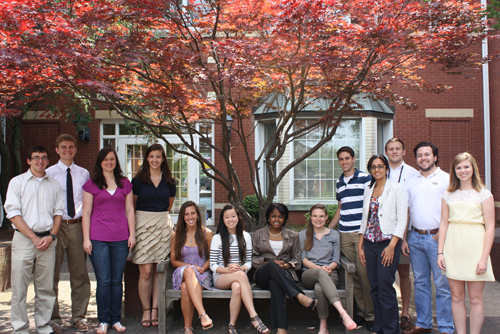
|
IAC Launches Student Ambassador Program
Our students are among the strongest advocates for the Ivan Allen College of Liberal Arts. Through a new Student Ambassadors Program, undergraduates can formally support the College by sharing their experience and enthusiasm with a variety of constituents.
Twelve students have been selected as ambassadors for the upcoming academic year. They will help represent IAC to prospective students and their families, alumni, strategic partners, and friends of the College through a wide array of activities including liberal arts campus tours, freshman orientations, outreach to high schools, and promoting the college through social media.
“These are outstanding students and we are extremely pleased to have them dedicate their time to support College activities that educate and inspire our liberal arts community,” said Elizabeth Miller, Manager of Enrollment and Student Affairs, who initiated the program.
Following are some of the reasons for wanting to participate in the program shared by applicants:
"I have a story to tell about why I became a liberal arts major and how I came to love what I do through the Ivan Allen College."
"I have had so many great experiences in the classroom, educational and social, that have challenged the way I think and learn and that is an experience I want to pass on to others."
"This is my chance to give back to the Ivan Allen College that has helped me enjoy my undergraduate education and make a difference."
"I would take a lot of pride in knowing that, 10 years from now, the Ivan Allen College had reached new heights in part because of the IAC [Student] ambassadors."
Under Miller’s supervision, the ambassadors undergo extensive training to prepare them to communicate the mission and culture of the College, promote Georgia Tech/IAC pride, and encourage lifelong involvement with the College. Ambassadors serve a one-year term providing 10 hours of service each month and 25 service hours during the summer.
Applicants came from across our six schools. Following are the 2011-20112 Student Ambassadors and their majors. Their profiles and more about the program will be available soon at www.ambassadors.iac.gatech.edu. Michael Boland -IAML, Alex Dabrowska -IAML, Graham Goldberg -PUBP, Cody Hutchings -HTS, Emily Jackson -IAML, Kaitlyn Johnson -IAML, Elizabeth Perreault -GEML, Shawn Skolky- PUBP, Zack Smith -PUBP, Rebekah St. Clair -PUBP, Vett Vandiver -STAC, Nanki Walia -ECON, Cassie Xie -STAC
|
Bicycling at Tech: A Student-Led Initiative
Johann Weber, PhD student in the School of Public Policy, is the chairman of Georgia Tech's Bicycle Infrastructure Improvement Committee (BIIC). Weber wrote an essay detailing the history of the BIIC that was featured in the Association for the Advancement of Sustainability in Higher Education's (AASHE) Student Diary Series, a feature that encourages student-led intiatives for sustainability. Weber's essay is reprinted here.
In the fall of 2010, a handful of graduate and undergraduate students at Georgia Tech from a wide range of departments including Environmental Engineering, Aerospace, Chemical Engineering, Public Policy, and Civil Engineering who were interested in bicycling began an active and ongoing discussion about how to make the campus more bike friendly. Many of us had strong environmental motivations, and all of us recognized the ease, enjoyment, and bargain that bicycling can provide to students, faculty and staff of a large urban university such as Georgia Tech.
Before this began, the campus had a number of buildings with dramatically insufficient parking, and only two segments of bike lane. We firmly believed that with better facilities, more students would be inclined to ride; a winning proposition for the students, the campus, and the metro area of Atlanta, which is infamous for both its congestion and poor air quality.
Through close interaction with a staff member in the office of Parking and Transportation, this general desire to improve campus coalesced into the more concrete task of forming a committee that would provide suggestions for improvements and facilitate their undertaking. This included identifying funding, selecting contractors, and installing them. To do so would require incorporating a number of departments on campus, all of whom had no shortage of projects on their plates already. Yet those departments embraced the opportunity and challenge presented to them, with many offering not only to participate but actively asking to be committee members so that they could be as useful as possible.
The Student Government Association (SGA) approved the formation of the institute-wide committee in January, and our first meeting brought to the table Parking and Transportation, Facilities (responsible for all infrastructure projects and maintenance), Campus Planning, Auxiliary Services, as well as members of the Sustainability Committee, StarterBikes (an on-campus bike cooperative), SGA, and the city’s bicycle advocacy group, the Atlanta Bicycle Coalition.
As a committee we identified—based on existing knowledge of demand and usage—where there was a need for more bicycle parking, and identified viable corridors for the installation of bicycle lanes (based on road width and conditions). We then secured cost estimates for each project, and compiled a list totaling around $45,000. Originally, our hope was to push for an increase to the student fee for parking and transportation by $1 per term. This would bring in around the desired amount of money thanks to a student population of more than 20,000. However, meetings with SGA quickly made it clear that while they supported our efforts, they would not support increased student fees and, more importantly, it was unlikely that the logistics of such an action would prove manageable. They suggested an alternative solution: Ask the student body directly for the money. A bill could be drafted to request that money be given to the committee, which could disperse it to the departments involved in the projects. While $45,000 was probably not in the cards, a smaller amount could be feasible, and would be popular since it involved an investment in infrastructure, rather than a temporary support for a small campus group.
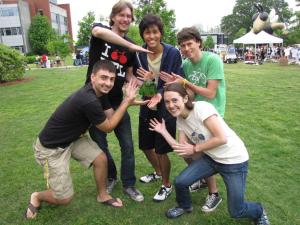 So we altered the project list, cutting it down to a more manageable $26,146, including .8 miles of bike lanes and 6 racks (a total of 58 parking spaces). We wrote up the bill and submitted it. It went before the chambers of the SGA in March 2011 and was passed. This was a huge success, proving not only that the campus wanted these improvements, but also that they were willing to work together and devote money to make them happen. So we altered the project list, cutting it down to a more manageable $26,146, including .8 miles of bike lanes and 6 racks (a total of 58 parking spaces). We wrote up the bill and submitted it. It went before the chambers of the SGA in March 2011 and was passed. This was a huge success, proving not only that the campus wanted these improvements, but also that they were willing to work together and devote money to make them happen.
We rapidly followed up this success by constructing a website entirely devoted to bicycling at Georgia Tech (bike.gatech.edu), as well as Twitter and Facebook accounts to supplement it. In addition, Parking and Transportation collected a commuter survey, giving us a baseline mode share for bicycling on campus, and helping us direct future projects. BIIC also created subcommittees tasked with maintaining the website, constructing a bike master plan, and securing funding for further development. We welcomed new members from Campus Police and the Office of Environmental Health and Safety.
In April, BIIC was awarded the 2011 Georgia Tech Environmental Initiative Award in recognition of its accomplishments, and in May we began the process of working with Campus Planning to finalize the precise details of the roadway projects, as well as ordering the racks. This led to the decision to replace downhill segments of lane with sharrows (an on-road marking noting that bicycles and cars will share the lane) to help ease merging points and reduce the need to move the centerline (a costly endeavor).
As of this July, the project details have been finalized, and Campus Planning has taken the additional step of selecting other roads for sharrow installation, contingent upon funding. The racks have arrived, and we are preparing to install them. The website is live, a student survey has been prepared for the fall, and orientation education programs are in the works.
We’ve submitted grant applications to a number of organizations, and are hoping to hear back soon, while also pursuing funding from Georgia Tech. Most recently, we added two faculty members to the committee, and are working to begin the roadway projects as soon as the last details and contracting are ironed out.
In many ways, the first year has been a great success. Looking back on what was available and being done a year ago, BIIC has made huge leaps forward. However, we look at our peer institutions, and we know we have a long way to go. It was also enlightening to see how difficult a process this can be, even when all the stakeholders are committed and supportive. In sum, things are good, but they can always be better, and we will continue to work hard to make Georgia Tech a place that not only educates in and researches sustainability, but practices a more sustainable way of living every day.
|
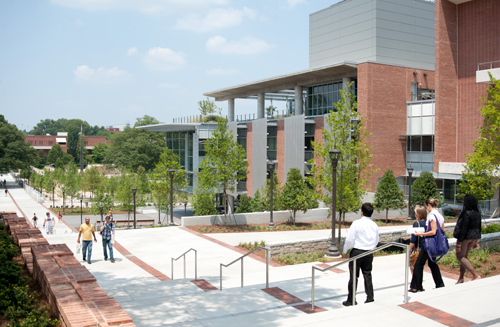
|
This Month's Banner Photo - Tech Walk
Newly opened is the freshly rebuilt walkway between the Skiles Building and Georgia Tech's newest facility, the G. Wayne Clough Undergraduate Learning Commons. Formerly known as "Skiles Walkway," the renovated pedestrian thoroughfare has been renamed Tech Walk.
|
|

